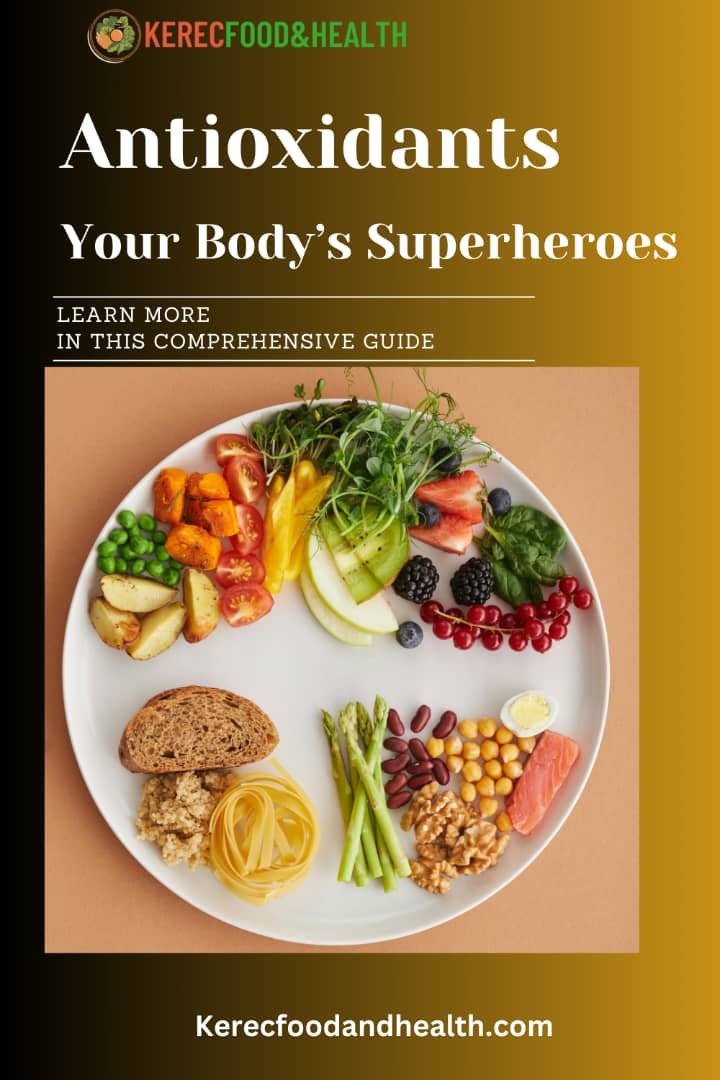Have you ever wondered how some people seem to glow with health, stay healthy and age gracefully while others struggle with constant fatigue, illness, or even premature aging? The answer might be simpler than you think: antioxidants. These natural compounds are like superheroes for your body, fighting off harmful invaders called free radicals. But what are antioxidants, and why are they so important? Let’s break it down.
What Are Antioxidants?
Antioxidants are natural compounds found in foods which help protect your cells from damage caused by free radicals. Now, free radicals may sound like troublemakers—and they are! These unstable molecules are created during normal processes like metabolism or when you’re exposed to things like pollution, cigarette smoke, sunlight, poor diet, and even your body’s normal processes.
If left unchecked, these free radicals cause oxidative stress, which damages your cells and leads to problems like premature aging, inflammation, and chronic diseases like heart disease, cancer, or diabetes. Thankfully, antioxidants step in to neutralize these harmful molecules, keeping your body in balance and functioning at its best.
How Antioxidants Work
The magic of antioxidants lies in their ability to stabilize free radicals. Free radicals are like unstable guests at a party—they steal electrons from nearby molecules, causing chaos and damage. Antioxidants step in as the peacemakers, donating electrons to free radicals without becoming unstable themselves. This action prevents a chain reaction of damage that could otherwise harm proteins, lipids, and even DNA.
Moreover, antioxidants don’t just work in isolation. They often function as a team. For instance, vitamin E can neutralize free radicals in cell membranes, while vitamin C regenerates vitamin E so it can continue its protective role. This teamwork ensures that your body’s defense system remains strong and efficient.
Different Types of Antioxidants and Why They Matter
Have you ever heard the saying, “You are what you eat”? When it comes to antioxidants, this couldn’t be truer! These natural compounds are like the body’s personal defense team, protecting your cells from damage caused by free radicals. But did you know there are different types of antioxidants, each with its own unique role? Let’s meet the different types of antioxidants and learn why they’re so important.
1. Vitamin C: The Immune Booster
Think of vitamin C as the multitasker of antioxidants. It doesn’t just protect your cells; it also supports your immune system, helps your body absorb iron, and promotes glowing skin. You’ll find it in citrus fruits like oranges and lemons, as well as in strawberries, bell peppers, and broccoli.
Here’s a tip: since vitamin C is water-soluble, your body doesn’t store it. That means you need to get a fresh supply every day!
2. Vitamin E: The Skin Protector
If you’re looking for an antioxidant that keeps your skin youthful, vitamin E is your go-to. This fat-soluble vitamin shields your cells from oxidative stress, especially in your skin. It’s also great for your heart and immune system.
You’ll find vitamin E in nuts like almonds and hazelnuts, seeds like sunflower seeds, and leafy greens like spinach. Adding these to your meals is an easy way to give your body a vitamin E boost.
3. Beta-Carotene: The Eye Care Expert
Ever wonder why carrots are so good for your eyes? It’s all thanks to beta-carotene, a type of antioxidant that converts into vitamin A in your body. This powerhouse supports your vision, boosts your immune system, and helps maintain healthy skin.
Besides carrots, you’ll find beta-carotene in sweet potatoes, pumpkins, and other orange or yellow fruits and veggies. So, the next time you’re at the store, think orange!
4. Polyphenols: The Heart Helpers
Polyphenols are plant-based antioxidants known for their ability to support heart health and brain function. They’re found in foods and drinks you probably already enjoy, like green tea, coffee, dark chocolate, and red wine (in moderation, of course!).
Polyphenols are also abundant in fruits like grapes, apples, and berries. So, if you’re a fan of colorful, flavorful foods, you’re already reaping the benefits of this antioxidant group.
5. Selenium: The DNA Defender
Selenium might not get as much attention as the others, but it’s just as important. This mineral helps repair DNA, supports your immune system, and reduces inflammation.
You’ll find selenium in Brazil nuts, fish, eggs, and whole grains. Just one or two Brazil nuts a day can give you all the selenium your body needs!
6. Lutein and Zeaxanthin: The Eye Protectors
These lesser-known antioxidants are the guardians of your eyes. They protect your vision by filtering harmful blue light and reducing the risk of conditions like macular degeneration and cataracts.
You can get lutein and zeaxanthin from leafy greens like kale and spinach, as well as from eggs and corn. Adding these to your diet is a simple way to keep your eyes sharp.
7. Flavonoids: The All-Around Champions
Flavonoids are a large group of antioxidants found in a variety of foods, including fruits, vegetables, tea, and chocolate. They help fight inflammation, reduce the risk of heart disease, and even support brain health.
Foods like apples, onions, and blueberries are rich in flavonoids. The next time you’re grocery shopping, think about adding these items to your cart.
8. Coenzyme Q10: The Energy Booster
Coenzyme Q10, or CoQ10, is a unique antioxidant that’s naturally produced by your body. It plays a crucial role in energy production and cell protection. However, as you age, your body’s production of CoQ10 decreases. To replenish it, you can include foods like fatty fish (salmon, mackerel), organ meats (liver, heart), and whole grains in your diet.
Making Antioxidants Part of Your Life
Antioxidants come in all shapes and sizes, but they all have one thing in common: they’re essential for your health. By including a variety of antioxidant-rich foods in your diet, you can protect your cells, support your immune system, and even slow down the aging process.
So, why wait? Start adding these antioxidant heroes to your plate today. Your body will thank you for it!
Why Should You Care About Antioxidants?
Here’s the thing: your body naturally produces some antioxidants, but it’s not enough to handle all the free radicals you’re exposed to daily. This imbalance can take a serious toll on your health over time. Let’s look at the specific ways antioxidants can make a difference.
1. They Protect Your Heart
Heart disease is one of the leading causes of death worldwide, but antioxidants can help reduce your risk. Compounds like polyphenols, found in tea, berries, and red wine, improve blood flow and lower inflammation. They also prevent LDL cholesterol (the “bad” kind) from oxidizing, which is a major factor in artery damage.
2. They Boost Your Immune System
You’ve probably heard that vitamin C is great for colds, and there’s truth to that! This antioxidant, along with vitamin E and selenium, strengthens your immune defenses, helping you fight off infections and recover faster when you’re sick.
3. They Slow Down Aging
We all want to look and feel young for as long as possible, right? Antioxidants like beta-carotene, found in carrots and sweet potatoes, protect your skin from harmful UV rays and reduce wrinkles. Plus, they keep your brain sharp, lowering your risk of Alzheimer’s and other age-related conditions.
4. They Lower Your Cancer Risk
Cancer develops when free radicals damage your DNA, leading to mutations. Antioxidants help by neutralizing these radicals and protecting your cells. While they’re not a guaranteed shield, eating antioxidant-rich foods like berries, spinach, and nuts certainly stacks the odds in your favor.
5. They Keep Your Eyes Healthy
As you age, your eyesight can start to decline. Antioxidants like lutein and zeaxanthin, found in leafy greens and eggs, protect your eyes from conditions like macular degeneration and cataracts. Think of them as sunglasses for your cells!
6. Support Brain Health
Antioxidants like flavonoids and polyphenols are known to protect brain cells from oxidative damage, reducing the risk of neurodegenerative disorders such as Alzheimer’s and Parkinson’s disease
7. Enhance Skin Health
Nutrients like beta-carotene, vitamin C, and vitamin E play a vital role in maintaining healthy, radiant skin by reducing UV-induced damage and promoting collagen production.
8. Reduce the Risk of Chronic Diseases
Studies have shown that diets rich in antioxidants can lower the risk of diseases like heart disease, type 2 diabetes, and certain cancers
The Bottom Line
Antioxidants matter because they’re your body’s frontline defenders. They protect your cells, keep your heart and brain healthy, slow down aging, and even reduce your risk of diseases like cancer.
By eating a variety of antioxidant-rich foods, you’re giving your body the tools it needs to thrive. So, next time you’re planning a meal, think about adding some colorful fruits, veggies, or nuts. Your body—and your future self—will thank you for it!
How to Add More Antioxidants to Your Diet
The good news? Getting more antioxidants is easier than you think. Here are some simple tips to work them into your daily meals:
- Load Up on Colorful Foods: Bright fruits and veggies like berries, spinach, tomatoes, and carrots are packed with antioxidants.
- Snack on Nuts: Almonds, walnuts, and Brazil nuts are not only delicious but also full of vitamin E and selenium.
- Sip Smarter: Swap sugary drinks for green tea, black coffee, or even a glass of red wine (in moderation).
- Go for Whole Grains: Foods like quinoa, oats, and brown rice are nutrient-rich and antioxidant-packed.
- Enjoy dark chocolate: Yes, chocolate can be good for you! Just choose one with at least 70% cocoa for maximum benefits. As a small piece of dark chocolate is a great source of flavonoids
- Add herbs and spices: Ingredients like turmeric, cinnamon, and oregano are packed with antioxidants and can enhance the flavor of your meals.
A Quick Warning About Antioxidants Supplements?
While it might be tempting to pop a pill, it’s best to get your antioxidants from whole foods. Why? Because supplements don’t always work the same way as food-based antioxidants, and taking too much supplements can disrupt your body’s natural processes and even cause harm. So, it’s best to stick to natural food sources rather than popping too many pills.
The Bottom Line
Antioxidants are your body’s unsung heroes, quietly working behind the scenes to keep you healthy, strong, and youthful. By adding antioxidant-rich foods to your plate, you’re giving your body the tools it needs to fight off free radicals, prevent disease, and stay vibrant.
So, why not start today? Your future self will thank you!
References
1. Aune, D., Giovannucci, E., Boffetta, P., et al. (2017). Fruit and vegetable intake and the risk of cardiovascular disease, total cancer, and all-cause mortality—a systematic review and dose-response meta-analysis of prospective studies. International Journal of Epidemiology, 46(3), 1029-1056.
2. Basu, A., Rhone, M., & Lyons, T. J. (2010). Berries: emerging impact on cardiovascular health. Nutrition Reviews, 68(3), 168-177.
3. Cabrera, C., Artacho, R., & Giménez, R. (2006). Beneficial effects of green tea: a review. Journal of the American College of Nutrition, 25(2), 79-99.
4. Cohen, G., Riahi, Y., Sunda, V., & Zick, Y. (2012). The insulin-mimetic agents as modulators of oxidative stress and inflammation. Endocrinology, 153(1), 16-23.
5. Halliwell, B. (2007). Oxidative stress and cancer: have we moved forward? Biochemical Journal, 401(1), 1-11.
6. Higdon, J. V., & Frei, B. (2003). Obesity and oxidative stress: A direct link to insulin resistance and type 2 diabetes? Diabetes Care, 26(7), 2153-2158.
7. Jacques, P. F., & Tucker, K. L. (2015). Are dietary patterns useful for understanding the role of nutrition in chronic disease? The American Journal of Clinical Nutrition, 101(4), 909-910.
8. Jennings, A., Cashman, K. D., Gillings, R., et al. (2018). A Mediterranean-like dietary pattern with vitamin D3 (10 μg/d) supplements reduced inflammation in older adults. The Journal of Nutrition, 148(3), 457-466.
9. Ried, K., Fakler, P.,& Stocks, N. P. (2017). Effect of cocoa on blood pressure. Cochrane Database of Systematic Reviews, 4, CD008893.
10. Sies, H.,& Jones, D. P. (2020). Oxidative stress. Encyclopedia of Biological Chemistry III, 3(4), 19-23.
11. Stahl, W.,& Sies, H. (2005). Bioactivity and protective effects of natural carotenoids. Biochimica et Biophysica Acta (BBA) – Molecular Basis of Disease, 1740(2), 101-107.
12. Vauzour, D., Vafeiadou, K., Rendeiro, C., et al. (2010). The neuroprotective potential of flavonoids: a multiplicity of effects. Genes & Nutrition, 5(2), 115-126.





